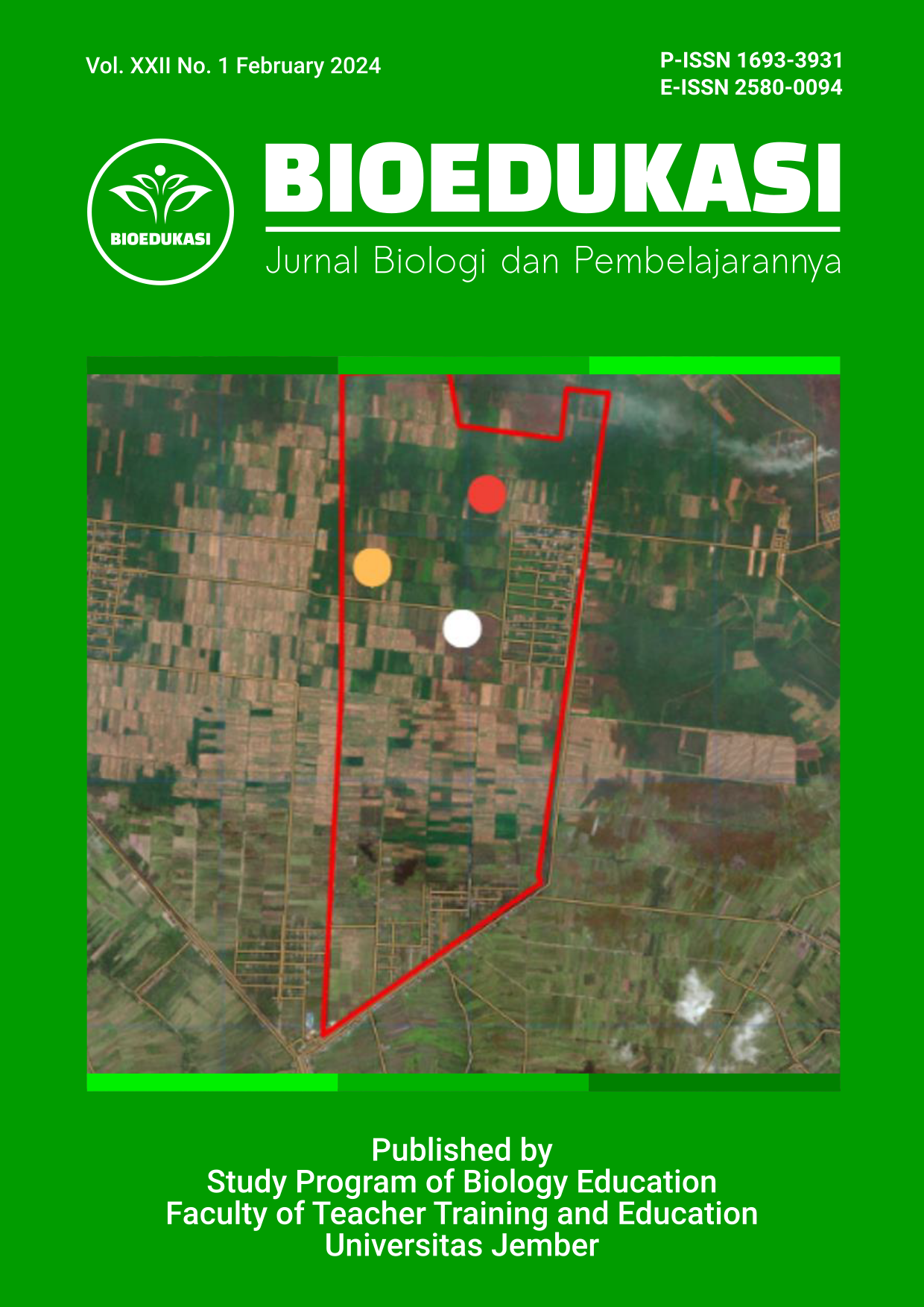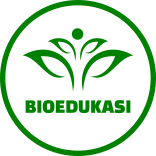Effectiveness of Transformative Green Economy in Biology (T-GEB) Learning Model on Changing Students' Conservation Perceptions about Elaeis guineensis Jacq. in Ecology and Socio-Economics
DOI:
https://doi.org/10.19184/bioedu.v22i1.42022Keywords:
Elaeis Guineensis Jacq., Learning Effectiveness, Perceptions of ConservationAbstract
Changing perceptions regarding the importance of conservation can be an effort to increase conservation awareness which is still low in society. This research aims to determine the effectiveness of implementing the Transformative Green Economy in Biology (T-GEB) Learning Model in changing students' perceptions of conservation. The sample for this research is class X students of State Senior High School 1 Turen for the 2022/2023 academic year. The type of quantitative research is pre-experimental using pretest-posttest and questionnaires, while qualitative data collection uses reflective essays. The application of the T-GEB Learning Model shows that learning is quite effective in improving students' cognitive learning outcomes, with an N-Gain Score of 58% on biodiversity material and 6.4% on environmental change material. the application of the T-GEB model can change students' perceptions of conservation from previously having a strong percentage of 77.7% to 91.3% which is classified as very strong based on the results of the conservation awareness questionnaire. Changes in students' perceptions of conservation are also supported by the results of reflective essays, with three themes formed, namely awareness of the important role of oil palm, perception of the impact of oil palm expansion, and awareness of conservation through oil palm expansion.
Downloads
References
Alfian, R., & Putra, P. M. A. (2017). Uji Validitas dan Reliabilitas Kuesioner Medication Adherence Report Scale (Mars) terhadap Pasien Diabetes Mellitus. Jurnal Ilmiah Ibnu Sina, 2(September), 176–183.
Anggraini, W. (2018). Keanekaragaman Hayati Dalam Menunjang Perekonomian Masyarakat Kabupaten Oku Timur. Jurnal AKTUAL, 16(2), 99. https://doi.org/10.47232/aktual.v16i2.24
Ardianti, R., Sujarwanto, E., & Surahman, E. (2022). Problem-based Learning: Apa dan Bagaimana. Diffraction, 3(1), 27–35. https://doi.org/10.37058/diffraction.v3i1.4416
Ardianto, Ulfa, A., & Khaerah, A. (2021). Peningkatan Hasil Belajar Biologi melalui Penerapan Model Pembelajaran Berbasis Masalah di Sma Negeri 5 Bulukumba. 4, 486–493.
Arifin, H. S., Fuady, I., & Kuswarno, E. (2017). Factor Analysis that Effect University Studen Perception in Untirta About Existance of Region. Jurnal Penelitian Komunikasi Dan Opini Publik, 21(1), 88–101.
Budaya, I., & Abad, K. (2018). Peranan Transformative Learning dalam Pendidikan Kimia: Pengembangan Karakter, Identitas Budaya, dan Kompetensi Abad ke-21. JRPK: Jurnal Riset Pendidikan Kimia, 8(1), 1–16. https://doi.org/10.21009/jrpk.081.01
Dawadi, S., Shrestha, S., & Giri, R. A. (2021). Mixed-Methods Research: A Discussion on its Types, Challenges, and Criticisms. Journal of Practical Studies in Education, 2(2), 25–36. https://doi.org/10.46809/jpse.v2i2.20
Ditjenbun. (2021). Statistik perkebunan unggulan nasional 2019-2021, kelapa sawit. Direktorat Jendral Perkebunan Kementerian Pertanian Republik Indonesia, 1–88.
Fena Ulfa Aulia, I. H. P. (2021). Jurnal penelitian ilmu sosial dan keagamaan islam. 18(1).
Hastjarjo, T. D. (2019). Rancangan Eksperimen-Kuasi. Buletin Psikologi, 27(2), 187. https://doi.org/10.22146/buletinpsikologi.38619
Heriyanto. (2018). Thematic Analysis sebagai Metode Menganalisa Data untuk. Anuva, 2(3), 317–324.
Herlin, L., Suwendra, I. W., & Haris, I. A. (2018). Faktor-Faktor yang Mempengaruhi Persepsi Siswa Smp Saraswati Singaraja terhadap Evaluasi Pembelajaran IPS Terpadu pada Tahun Ajaran 2017 / 2018. 9(2).
Imama, H. N. (2021). Pengaruh Efektivitas Pembelajaran dan Kemandirian Belajar terhadap Hasil Belajar Praktikum Akuntansi dengan Self Efficacy sebagai Moderasi The Effect of Learning Effectiveness and Independent Learning on Learning Outcomes of Accounting Practicum with Self. 18(3), 435–443.
Liauw, F. (2017). Konservasi masih Minoritas. Mintakat: Jurnal Arsitektur, 18(1), 10–21. https://doi.org/10.26905/mintakat.v18i1.1468
Lubis, S. S. W. (2019). Keterampilan Menulis Essai dalam Pembentukan Berpikir Kritis Mahasiswa Prodi PGMI UIN Ar-Raniry Banda Aceh. PIONIR: Jurnal Pendidikan, 8(2), 1–17. https://jurnal.ar-raniry.ac.id/index.php/Pionir/index
Maharani, N. M. A. P., Ardana, I. K., & P. (2019). Pengaruh Metode Bercerita Berbantuan Media Gambar Berseri Terhadap Keterampilan Berbicara Anak Kelompok a Di Tk Ikal Widya Kumara Sidakarya Tahun Ajaran 2018/2019. Jurnal Pendidikan Anak Usia Dini Undiksha, 7(1), 25. https://doi.org/10.23887/paud.v7i1.18742
Mukholifah, M., Tisngati, U., & Ardhyantama, V. (2020). Mengembangkan Media Pembelajaran Wayang Karakter Pada Pembelajaran Tematik. Jurnal Inovasi Penelitian, 1(4), 673–682. https://doi.org/10.47492/jip.v1i4.152
Nofri, B. A., Febriyana, K. R., & Handayani, M. N. (2022). Efektivitas model pembelajaran berbasis masalah dalam peningkatan pengetahuan green skills peserta didik smk. 7(1).
Olivia, J., & Nurfebiaraning, S. (2019). Pengaruh Video Advertising Tokopedia Versi “Jadikan Ramadhan Kesempatan Terbaik†Terhadap Respon Afektif. Jurnal Lontar, 7(1), 16–24. http://download.garuda.ristekdikti.go.id/article.php?article=1227583&val=11461&title=Pengaruh Video Advertising Tokopedia Versi Jadikan Ramadan Kesempatan Terbaik Terhadap Respon Afektif Khalayak#:~:text=Sehingga video advertising Tokopedia versi,yang dip
Purmadi, R. M., Santika, D. M. J., & Wulandari, A. S. (2020). Pentingnya Pendidikan Konservasi Untuk Menjaga Lingkungan Hidup ( Studi Kasus di Desa Cidahu , Kabupaten Kuningan ) The Importance Of Conservation Education To Preserve The Environment ( Case Study in Cidahu Village , Kuningan Regency ). Jurnal Pusat Inovasi Masyarakat, 2(4), 602–606
Rahayu, S. W., & Sugianto, F. (2020). Implikasi Kebijakan Dan Diskriminasi Pelarangan Ekspor Dan Impor Minyak Kelapa Sawit Dan Bijih Nikel Terhadap Perekonomian Indonesia. DiH: Jurnal Ilmu Hukum, 16(2), 224–236. https://doi.org/10.30996/dih.v16i2.3439
Ratnasari, D., Mahrawi, M., Wahyuni, I., & Octaviana, L. (2022). Pengaruh Augmented Reality Berbasis Web Dengan Model Problem Based Learning Terhadap Sikap Peduli Lingkungan Peserta Didik. Al-Ulum: Jurnal Sains Dan Teknologi, 8(1), 13. http://dx.doi.org/10.31602/ajst.v8i1.7903%0Ahttps://ojs.uniska-bjm.ac.id/index.php/JST/article/viewFile/7903/4576
Rusch, G. M., Bartlett, J., Kyrkjeeide, M. O., Lein, U., Nordén, J., Sandvik, H., & Stokland, H. (2022). A joint climate and nature cure: A transformative change perspective. Ambio, 51(6), 1459–1473. https://doi.org/10.1007/s13280-021-01679-8
Setiawan, A. (2022). Keanekaragaman Hayati Indonesia: Masalah dan Upaya Konservasinya. 11(01), 13–21. https://doi.org/10.15294/ijc.v11i1.34532
Sugrah, N. U. (2020). Implementasi teori belajar konstruktivisme dalam pembelajaran sains. Humanika, 19(2), 121–138. https://doi.org/10.21831/hum.v19i2.29274
Syarif, I., Utomo, E., & Prihartanto, E. (2021). Identifikasi Potensi Pengembangan Wilayah Pesisir Kelurahan Karang Anyar Pantai Kota Tarakan. Jurnal Cakrawala Indonesia, 1(3), 225–233.
Taylor, C. P. (2013). Research As Transformative Learning for Meaning-Centered Professional Development. In Meaning-Centered Education: International Perspectives and Explorations in Higher Education (Issue January 2013). https://doi.org/10.4324/9780203115084
Vebrianto, R., Thahir, M., Putriani, Z., Mahartika, I., Ilhami, A., & Diniya. (2020). Mixed Methods Research: Trends and Issues in Research Methodology. Bedelau: Journal of Education and Learning, 1(2), 63–73. https://doi.org/10.55748/bjel.v1i2.35
Vhalery, R., Setyastanto, A. M., & Leksono, A. W. (2022). Kurikulum Merdeka Belajar Kampus Merdeka: Sebuah Kajian Literatur. Research and Development Journal of Education, 8(1), 185. https://doi.org/10.30998/rdje.v8i1.11718
Westermann, J., & von Oheimb, G. (2021). Species-based or process-based conservation? Dealing with neophytes in the core areas of German national parks. Journal for Nature Conservation, 59(November 2019), 125924. https://doi.org/10.1016/j.jnc.2020.125924
Yusuf, F. (2018). Uji Validitas dan Reliabilitas Penelitian Kuantitatif. Jurnal Tarbiyah: Jurnal Ilmiah Kependidikan, 7(1), 17-23. https://doi.org/10.21831/jorpres.v13i1.12884






